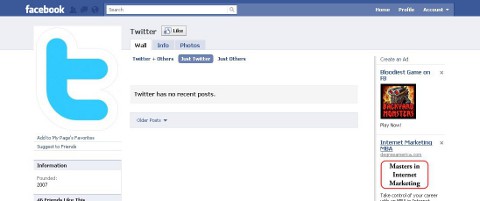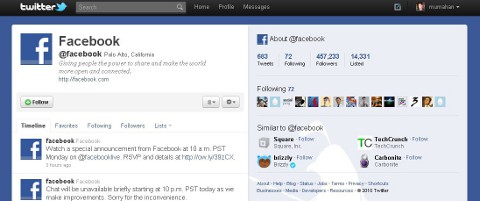
Have you ever seen those social media profiles on Twitter, Facebook, or elsewhere that use a company name and logo instead of a human name and a photo? Of course you have seen those. Pepsi, Doritos, McDonalds, Ford Motor Company, and a good number of others do that.
What about those profiles that are based on some presumably important industry keywords? You can see those on Twitter, and even more prominently on blog comments, but not likely from successful companies.
If you don’t know what I mean, you can see some comments from people such as “Custom Logo Design” right here on my blog. I let some of those remain, when they are not offensive, and when they don’t just drop links to their agenda in the comment text. All the same, they are missing a much greater benefit. Until they learn the importance of human connection, they will never know just how much they don’t know.
There is a right place to use a company name, and there is a wrong place. For example, Facebook profiles are not for companies (Facebook Pages are). If you don’t know when to act as a company or when to be a human, you are surely wasting a lot of effort.
Even if you are communicating on behalf of a company, there are many instances when placing your company name first is like shaking somebody’s hand and saying “Hi, my name is Acme Widget Company. It is nice to meet you.” Maybe you do that, but I’ll bet big money that you could sell a lot more widgets if you were a person.
It seems that many people misunderstand this concept of human instincts, and the importance of emotion in business. In fact, this article was inspired by a question I recently received questioning the best usage of Disqus when commenting on blogs. The question was as follows:
At first, I thought it was the worst question I heard all day. Then I realized how common it is for people to think that spreading their company name will be more helpful than giving people a reason to like them as a human.
Why Do We Prefer Humans? Because We Can Choke Them!
Companies build respect and trust much more effectively based on actions of people than by advertising the company name. This goes for huge corporations, and it goes for small “John and Mary Lunchbucket” companies. A big brand may have implied trust, and you may not worry about whether they are going to rip you off at every turn. Even in those cases, there is a far greater level of trust when there is a personal contact at the company who you can complain to, complement, or reach out and choke.
When you have a name, face, or voice, to go with the company, you have a real person you can hold responsible for doing what they say. It creates a feeling of personal accountability, and that builds trust. That person, whether in reality or perception, binds the company to doing what they tell you, and they become the company. Have you ever tried to wrap your fingers around the neck of a company? It just isn’t as satisfying.
Big Brands Get This, and We Appreciate Them!
Maybe you didn’t notice this, but three of the four companies I mentioned at the top of this article have names and faces prominently associated to their brand name. Below are some examples of companies putting names to their social media profiles. This not only benefits the company by adding a name and a face, but it also creates the understanding that even if they screw up, they are human. Humans make mistakes sometimes.



Yes, Humans Make Mistakes … Just Ask Red Cross!
Some companies worry that if they put a face with the company name, the human may make them look bad. After all, if Scott Monty from Ford was arrested for running naked through Central Park and screaming “Buy a Ford or I punch the old lady!”, it could look like Ford made an error in judgment. Of course, I doubt that is going to happen … right Scott?
Embarrassing moments do happen in social media. A classic one was when Gloria Huang of American Red Cross accidentally tweeted the statement below using the the wrong Twitter account.
Red Cross had a great response for that, just as they do for natural disasters. I suspect that even the most critical Red Cross supporters were forgiving after Social Media Director, Wendy Harmon’s response. Here is what she said:

Even today, just as I was writing this, they are not hiding the incident. I asked a question as follows:

Nearly immediately, I received two replies, first from Gloria, and then from Wendy. Here are the replies:
There were several other exchanges to follow, including birthday wishes to Ryan, and even Dogfish Head Brewery chimed in.
It was all a very human interaction, and a lot more friendly than communicating with a faceless institution.
Humans Achieve More in Social Media
Even with all the reasons people dream up to hide behind a company name or their favorite keywords when interacting online, humans win! Maybe you think that using your company name will bring more recognition to your company. Maybe you think that using your keywords will bring more web searches your way. Maybe all of the successful instances of being a human in social media are just lucky accidents.
Believe what you will, but my name is Mark Aaron Murnahan. I will take that over SEO and Social Media Marketing Consultant any day!
Oh, and one more thing! You may send your birthday wishes to Ryan, c/o Gloria Huang.
Podcast: Play in new window | Download





